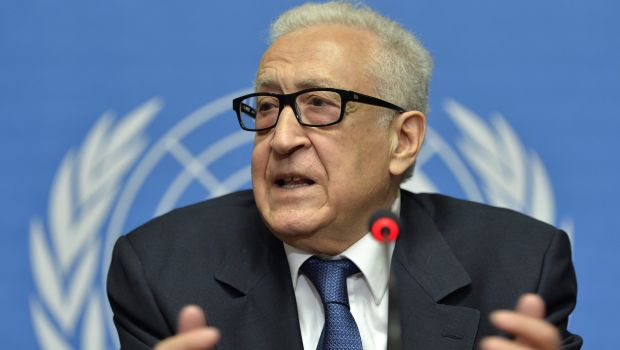
UN–Arab League envoy Lakhdar Brahimi speaks during a press conference after a meeting with US Secretary of State John Kerry and Russian foreign minister Sergey Lavrov, both unseen, at the European headquarters of the United Nations in Geneva, Switzerland, on Friday, September 13, 2013. (AP Photo/Keystone, Martial Trezzini)
Beirut, Asharq Al-Awsat—The United Nations peace envoy to Syria, Lakhdar Brahimi, said on Sunday he was “not 100 percent certain” that the Geneva II talks planned for mid-November will take place, in an admission of the obstacles to a political solution to the Syrian conflict.
In an interview with France’s TV5 and RFI radio, Brahimi said that peace talks going ahead as planned “is not a certainty,” though he said he is “trying to invite . . . everybody to come to Geneva in the second half of November.”
Brahimi urged both sides in Syria to sit on the negotiating table in Geneva this November “without preconditions.”
“Mr. Bashar Assad cannot say that he does not want to negotiate with this or that and the same thing applies to the opposition,” Brahimi said.
Both the government of Bashar Al-Assad and the Syrian opposition have previously set preconditions on their attendance at Geneva II, resulting in diminished hopes that the proposed peace conference will go ahead.
Assad has repeatedly dismissed the possibility of holding any negotiations with Syrian opposition groups based outside Syria or with armed rebels, in a reference to the Syrian National Coalition (SNC) and its military arm, the Free Syrian Army (FSA).
On the other hand, the Syrian opposition insists that the planned Geneva talks should lead to Assad stepping down and the transfer of power to a transitional government.
In an interview with the Tishreen newspaper, Assad said: “We have no conditions except that there should be no negotiations with terrorists, weapons must be laid down, and there must be no calls for foreign intervention.”
The Syrian regime usually refers to armed rebels fighting to overthrow Assad as “terrorists.”
In another interview, with the German magazine Der Spiegel, Assad also said it was impossible “to solve the conflict in Syria through negotiations with gunmen,” adding that “political opposition should not take up arms.”
Assad, however, admitted to mistakes committed by his government, saying: “There were personal mistakes made by individuals. Every human makes mistakes. A president also makes mistakes.”
For its part, the SNC does not seem to believe it is possible to find a political solution to the crisis. In exclusive comments to Asharq Al-Awsat, a senior member of the SNC, Kamal Al-Labawani, said that it is true that “the opposition announced its willingness to participate [in Geneva II],” but the SNC is “of the view that it is not possible for the Geneva II conference to be held.”
He also added that Geneva II will be the “gateway to the end of Syria,” as it will involve “compromising its identity and unity.”
“It is not possible to sit at the negotiating table with Assad and offer compromises while Syrians are dying from hunger in the Ghouta district of Damascus,” Labawani said, adding that a decision to head to Geneva on the part of the opposition “should be preceded by a series of serious steps by the Syrian regime, such as opening safe humanitarian corridors, announcing the names of the [political] prisoners, and stopping aerial shelling, which Assad does not plan to do.”
